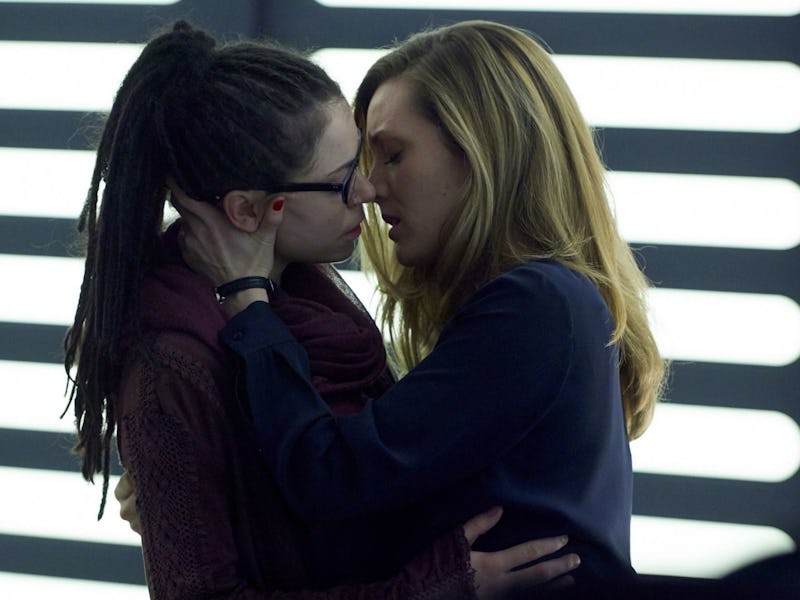According to 'Orphan Black' Lesbians Are Real People Too
They're good, they're bad, but they're seldom ugly.

Since dinosaurs roamed the Earth, lesbians in the media — and by that I mean mainstream movies and television — have suffered never-ending vilification. Some of which can be traced all the way back to a tenet of the Hays Production Code, prohibiting filmmakers from including “gay propaganda” in their works. However, a loophole circumnavigating that ban did permit homosexuality in public service announcements. One in particular is this one from 1938 called Lesbian Menace. It alerts folks to the dangers of lady love (spoiler: it all starts with shoulder rubbing).
While the history of the counteractive efforts to assert positive lesbian characters in film and TV since has already been discussed and dissected, it’s worth noting that in spite of such discourse — women who love women continue to be portrayed in a less than realistic light. Because, according to Hollywood’s unwritten rules most serve little use other than as a tool to titillate men, or to fulfil a villain quotient. Therefore, there’s rarely a happy ending for lesbians.
Orphan Black, on the other hand, has racked up a ton of accomplishments in the name of lesbian, and indeed female, visibility. In an era where actresses rage against the media machine for failing to provide well-rounded roles that aren’t busty girlfriends or whining wives, Orphan places a group of fully-rounded women at the center of its story. Aside from the main five clones — all of which are played by the same actress, Tatiana Maslany — a further two women feature in the main cast. One of whom seduces a clone she’s tasked with monitoring, leading to an much-needed renovation of outdated - and damaging — lesbian stereotypes. Perhaps its most admirable quality is the show’s approach to the sexual orientation of its clones. Because there isn’t one. They just exist, and there’s no hoopla made of the fact that Cosima, the loveable nerd who could kick your ass at Rune Wars and make you weak at the knees with her cheeky grin, is gay.
Some attempts to reverse the fate of lesbians in television - Buffy and Supernatural, to name but two examples - resulted in strong, ass-kicking women. On both shows, their feisty sapphic geek grrls allayed the notion that all gay women are trying to sleep with you, and that they’re brimming with untold evil. However, on both shows two of those trendsetters were also killed. Orphan Black wandered down that same path — the good gay was always secretly bad — and then somehow, amidst its complex web of narrative threads, did a complete 180.
Ah, Delphine. From the outset, her motivations weren’t exactly upstanding. She befriended Cosima, stalking her in the university library, with the goal of infiltrating the sisterhood on behalf of neolutionist Dr. Leekie. But then something happened: she fell in love with her subject. Then came the blossoming romance that spawned a group of loyal followers who couldn’t get enough of “Cophine.”. But at the start of season three, lesbians the world over sighed as Delphine heartlessly dumped Cosima like a hot potato. Delphine immediately became that type of lesbian. She had switched sides to help the clones and switched back to aid Dyad as the new Rachel. She was The Baddie. She even had the sexy haircut that gay women are only permitted if they’re true emissaries of beelzebub.
But here’s the rub. Delphine is a complex, three-dimensional character. She doesn’t merely oscillate between ‘hero’ and ‘villain’ — although that in itself would be progress — she occupies all of the grey area in between. You know, like an actual person. Notions of ‘good’ and ‘bad’ are explored via a plot development that finds Delphine interrogating Cosima’s new girlfriend Shae, operating on false intel that she’s actually a mole. You’re sort-of backing the French temptress on this one, because as the show constantly reminds us — when you’re a clone, you can’t trust anyone. Similarly, the shitshow of rage Delphine showers upon the defenseless woman makes it easy to root for Shae. There’s no easily-defined incident, or character trait, established to signify that either of these women are truly reprehensible. They simply are who they are.
Granted, Delphine meets her maker at the end of the season, but judging by the way she’s behaved — she’d get offed if her character were straight. She embraces her fate and embarks on a last day of tying up loose-ends. That road to redemption arc concluding with death isn’t exclusive to her — Paul also parted the show via similar means. It’s a breath of much-needed fresh air that her sexual orientation (and for that matter, her gender) doesn’t inform her fate. Instead of being ‘punished’ like onscreen lesbians have in the past, Delphine’s bullet to the gut happens because… she kinda had it coming.
On that note, there is one aspect of the doomed lesbian romance in Buffy I’d happily see Cosima embrace at the outset of S4. Going full-on Dark Willow.